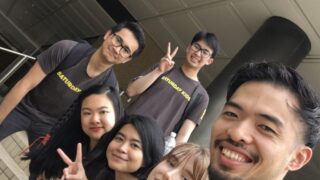Who dominates the world today?
In recent years, the voices and power of the young generation are on the rise. According to the Economic Times, “About 52% of the total world population is under 30 years old.” These young people—millennials and generation Z—have great potential to change societies across the globe.
Who are these young people in Japan? This Young Rising Stars series will put them in the spotlight to find out!
First up is Yu Shinagawa, founder and CEO of An-Nahal Inc., which focuses on career development for foreign nationals, as well as diversity inclusion training for Japanese companies.

The opening party of An-Nahal Inc. | ©An-Nahal Inc.
How a Refugee and an Ocean View Sparked a Passion for Change
Yu Shinagawa is on a mission to help create a society where people can embrace each other’s differences. It all started when, as a teenager, she realized that Japan has a long way to go toward kindness and inclusivity.
At seventeen, Shinagawa met a refugee woman from Vietnam during an event run by the Kanagawa International Foundation. Having fled her country during the Vietnam War, the woman shared a harrowing survival story of escaping to Japan by boat.
But the most shocking part for Shinagawa was the hardship the woman faced after all that, once she arrived in Japan.
From language barriers to cultural resistance, integration into society was hardly easy. Others in her situation were just as frustrated—one man went from being a lawyer in Vietnam to washing dishes in a ramen shop. Children were bullied because their lunches “smelled funny.”
They were far from the war, but times were still hard.
“A lack of systemic support for foreign citizens (not just refugees) means fewer employment opportunities, limited interaction with locals, and systemic discrimination,” Shinagawa explains.
She began to ask herself, “How can I make a better Japan for everyone?”
Her next revelation came when she was nineteen, participating in the Ship for World Youth Program. Run by Japan’s Cabinet Office, the program sends youth from around the world on a global cruise. Through her time with these international peers, she came to understand that differences don’t come from nationality, but from individuals.
Next Article
After Searching the Globe, Star Educator Finds Purpose at Home
Catalyzing Digital Transformation through the Human Element
Lead Your Family Business through Crisis with These 3 Questions
Finding a Career in Talent Development: Education vs. Inspiration
At Aoyama Gakuin University, Shinagawa entered the School of International Politics, Economics, and Communications. But like many young people, she had yet to determine a clear path for her future.
“Honestly,” she says, “talent development wasn’t my focus, but there was a class to learn how to set up workshops and training programs to promote cross-cultural understanding in business.”
This caught her interest, but finding her passion was less about education and more about pursuing inspiration.
In her time with Ship for World Youth Program, Shinagawa made a friend from Kenya. Though he’d grown up in the slums, the opportunities he’d found through education had led to his election as a representative on the ship. Later, he went on to running his own school. As someone who had risen from the bottom himself, he was ideally positioned as a role model to shape the next generation and influence real social change.
Thinking about this friend made Shinagawa wonder: financial and legal support are often available to refugees, but what about leadership? What about role models?
She realized there was real value in developing leaders who can bring change to society in the long term. So after graduation, she worked for six years in talent development and then, at twenty-eight, quit her company to become a freelancer. This bold decision brought opportunities to work with the World Bank and the United Nations High Commission for Refugees in Japan.
Finally, in 2019, she founded her own company, An-Nahal Inc., with a few trusted fellows.
Discovering an Untapped Market for Sweeping Social Change
An-Nahal focuses on both the company side, promoting diversity for the globalized era, and the recruitment side, helping foreign nationals who aspire to work in Japan. Shinagawa emphasized that she wanted to bring systematic change through her business—both economic and social. To her, this was the best way to make an actual impact on the current societal norms in Japan.
“I want to change the stereotype which regards foreigners as low-paid workers or people who need support. Really, they are the ones who support Japanese society. They’re the assets, but they’re missing the opportunities.”
Corporate training programs in Japan tend to be fairly one sided, focusing on how to make foreign employees more Japanese through language classes, cultural workshops, etc. Few programs even think to go the other way—teaching Japanese employees to manage foreign talent effectively.
An-Nahal saw the untapped market and went for it.
A primary goal of Shinagawa’s company is to reeducate—not by one-way input, but by creating a dialogue to encourage Japanese business leaders to embrace diversity. This includes consulting services, as well as leadership workshops that get to the heart of the problem.
“Some studies show that one of the biggest obstacles to hiring foreign talent is the limited capability of Japanese managers to properly manage a diverse team,” Shinagawa says.
An-Nahal is eager to help eliminate that statistic by providing a simple solution: put Japanese managers in a room (or these days, a video chat or Slack channel) with international talent and help them learn to communicate.
The problem was never that Japanese people couldn’t communicate—the problem was that they lacked opportunities to try. Creating such experiences is a simple solution with a potentially huge societal impact.
“Experience can help change the Japanese perspective of foreigners,” says Shinagawa, “from low-paid workers to professional assets who can contribute to Japanese society—both economically and culturally.”






